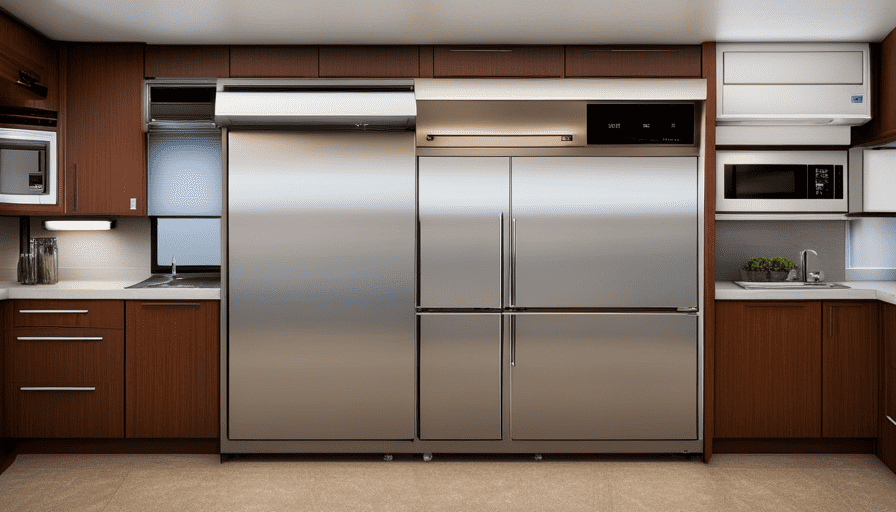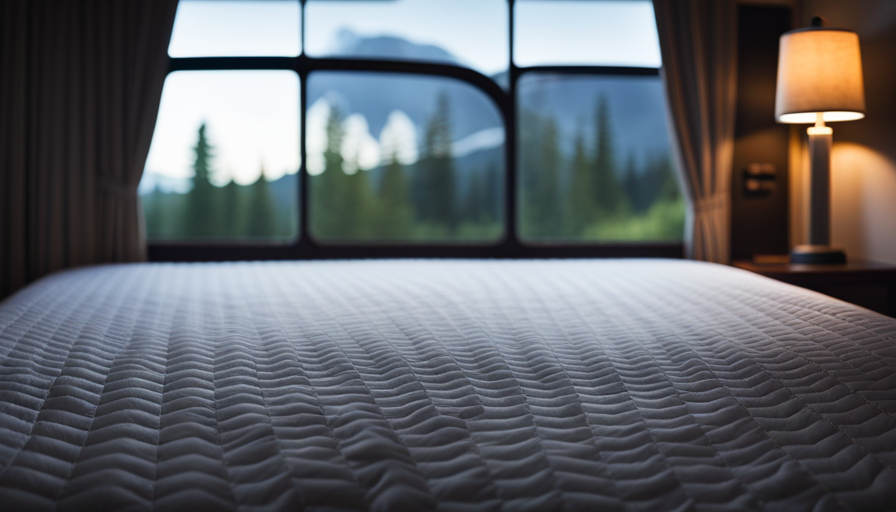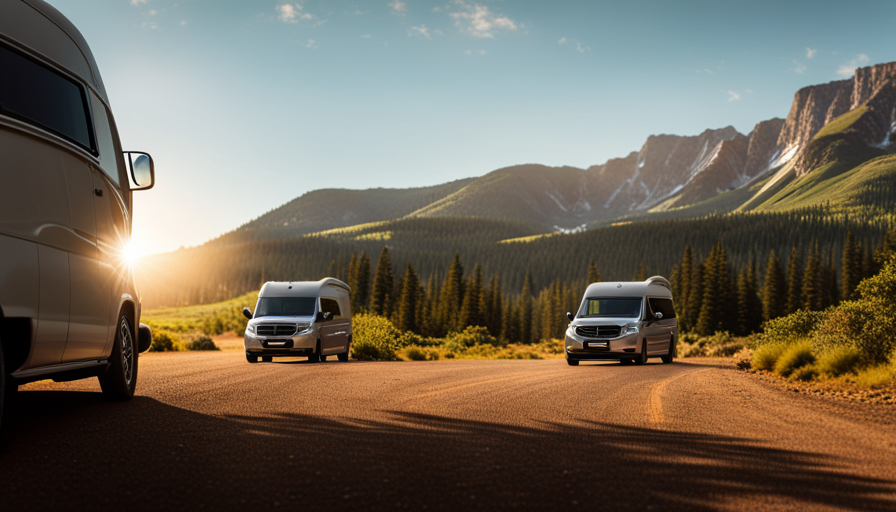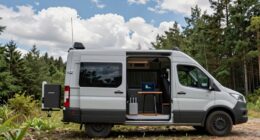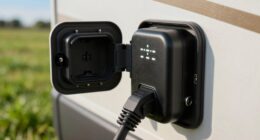Imagine this scenario: you’re in the wilderness, enveloped by the splendor of the natural world, and the only thing lacking is a chilled beverage. However, you find yourself in a camper, far from any electrical supply. How do you manage to keep your eats and drinks cold without the usual means of refrigeration? This is the moment for a propane refrigerator to shine.
In this article, we will delve into the inner workings of a propane refrigerator and explore how it keeps your food cold even in the most remote locations. From understanding the basics of propane refrigeration to learning about its components and energy efficiency, we will cover it all.
We will also discuss the installation and maintenance of a propane refrigerator, along with the benefits it offers over other refrigeration options for campers.
So, whether you’re a seasoned camper or just starting out, read on to discover how a propane refrigerator can be your ultimate cooling companion on your outdoor adventures.
Key Takeaways
- Propane refrigerators in campers use propane gas as the energy source for cooling.
- The cooling process involves the ignition of propane gas, which heats up the generator and causes ammonia and hydrogen gas to separate.
- Ammonia vapor condenses in the condenser coils, cooling the refrigerator’s interior, while liquid ammonia flows to the evaporator coils to further cool down the interior.
- Propane refrigerators are energy-efficient, suitable for off-grid camping, and have higher cooling capacity, energy efficiency, longer lifespan, and require less maintenance compared to electric refrigerators.
Basics of Propane Refrigeration
So, you’re probably wondering how a propane refrigerator works in your camper, right? Well, let me break it down for you.
Propane refrigeration is a process that relies on the use of propane gas as a source of energy to cool the interior of the refrigerator. The cooling process begins when the propane gas is ignited and burns in a small flame. This flame heats up a chamber called the generator, where a mixture of ammonia and hydrogen gas is present.
The heat from the flame causes the ammonia and hydrogen gas to separate, with the ammonia turning into a vapor and rising to the condenser coils at the top of the refrigerator. As the ammonia vapor cools down in the condenser coils, it releases heat and condenses back into a liquid form. This process causes the interior of the refrigerator to cool down.
The liquid ammonia then flows down into the evaporator coils, where it evaporates and absorbs heat from the interior of the refrigerator, further cooling it down. This cycle continues as long as the propane gas is being burned.
So, now that you understand the basics of propane refrigeration and its energy consumption, let’s move on to the next section where we’ll discuss the components of a propane refrigerator.
Components of a Propane Refrigerator
To keep your camper cool, imagine a clever contraption with intricate parts that silently hums and magically chills your food and drinks. This contraption is called a propane refrigerator, and it consists of several components that work together to provide efficient cooling.
The installation process of a propane refrigerator in a camper involves mounting the unit securely and connecting it to the propane supply. The refrigerator also needs a ventilation system to ensure proper air circulation. Additionally, it requires a 12-volt DC power source to operate the control panel and fans.
Maintenance requirements for a propane refrigerator include regular cleaning of the burner and flue, as well as checking for any leaks in the propane supply system. It’s also important to keep the refrigerator level to ensure proper performance. Regularly inspecting the seals and gaskets is crucial to prevent any air leaks that can affect cooling efficiency.
Propane refrigerators are known for their energy efficiency, as they don’t rely on electricity to function. They use propane gas as the primary fuel source, which makes them ideal for off-grid camping.
In the next section, we will explore the energy efficiency of propane refrigerators and how they can save you money and resources.
Energy Efficiency
When comparing propane refrigerators to electric refrigerators, there are a few key points to consider. Propane refrigerators are generally more energy efficient than their electric counterparts, as they don’t rely on electricity to operate. However, it’s important to note that propane refrigerators do require a constant supply of propane gas to function properly.
To maximize energy efficiency in a propane refrigerator, it’s recommended to keep the unit well-maintained, ensure proper ventilation, and avoid overloading it with food or drinks.
Comparing Propane Refrigerators to Electric Refrigerators
If you’re looking for a more energy-efficient option for your camper, propane refrigerators offer a great alternative to electric ones. When comparing propane refrigerators to electric refrigerators, there are a few key differences to consider.
-
Propane vs. Solar Refrigeration: Propane refrigerators use propane gas as their primary source of energy, while solar refrigerators utilize solar panels to generate electricity. Propane refrigerators are advantageous for campers who don’t have access to electricity or reliable sunlight.
-
Cost Comparison: Propane refrigerators generally have a higher upfront cost compared to electric refrigerators. However, they can save you money in the long run, as propane is often cheaper than electricity.
-
Environmental Impact: Propane refrigerators produce lower greenhouse gas emissions compared to electric refrigerators, making them a more sustainable choice.
To maximize energy efficiency in a propane refrigerator, there are a few tips to keep in mind.
[Transition sentence to subsequent section.]Tips for Maximizing Energy Efficiency in a Propane Refrigerator
For the most efficient cooling in your propane fridge, remember to keep the door closed tightly and avoid frequent opening. This is crucial for maximizing cooling capacity and reducing propane consumption.
When the door is opened frequently, warm air enters the refrigerator, causing it to work harder to cool down again. Additionally, ensure that the door seals are in good condition and free from any debris or damage.
Another tip for maximizing energy efficiency is to avoid overloading the refrigerator. When the fridge is too full, air circulation is hindered, and the cooling process is less effective.
Finally, keep the refrigerator away from direct sunlight or heat sources, as this can make it work harder to maintain the desired temperature. By following these tips, you can optimize the performance of your propane refrigerator.
When it comes to installation and maintenance, there are a few key steps to ensure its longevity and efficiency.
Installation and Maintenance
To properly install and maintain a propane refrigerator in your camper, you’ll need to carefully position it in a well-ventilated area to ensure efficient operation and prevent any potential safety hazards. When installing the refrigerator, make sure it’s level to allow for proper circulation of the coolant. Also, keep in mind that the refrigerator needs to be securely fastened to prevent it from shifting while on the road.
In terms of maintenance, it’s important to follow a regular schedule to keep your propane refrigerator running smoothly. Clean the burner and flue regularly to remove any debris that may obstruct the flow of gas or air. Inspect the seals and gaskets for any signs of wear or damage, as these can lead to leaks and reduce the efficiency of the refrigerator. Additionally, check the propane supply and regulator for any leaks or issues.
By following these installation tips and maintaining a regular maintenance schedule, you can ensure that your propane refrigerator in your camper operates efficiently and reliably. With its ability to provide cooling without the need for electricity, a propane refrigerator offers numerous benefits for camping trips.
Benefits of a Propane Refrigerator
One of the advantages of a propane fridge in your camper is its ability to cool your food and drinks efficiently and reliably. Propane refrigeration offers several benefits that make it an excellent choice for campers.
Firstly, propane refrigerators have a higher cooling capacity compared to electric refrigerators. This means they can cool your food and drinks quickly, even in hot climates. Additionally, propane refrigerators are more energy-efficient, allowing you to save on your camper’s battery power. They also have a longer lifespan and require less maintenance compared to electric refrigerators.
Another advantage of using a propane refrigerator in a camper is its ability to operate independently of electricity. This is particularly useful when you are camping in remote areas without access to electricity. Propane refrigerators can run on propane gas, which is readily available and can be stored in portable tanks.
To better understand the benefits of propane refrigeration, let’s take a look at the following table:
| Benefits of Propane Refrigeration |
|---|
| Efficient cooling capabilities |
| Energy-efficient operation |
| Longer lifespan and less maintenance |
A propane refrigerator in your camper offers several advantages, including efficient cooling, energy efficiency, and independence from electricity. However, it is important to consider the limitations and other factors before making a decision.
Limitations and Considerations
Now that we’ve explored the benefits of a propane refrigerator in a camper, it’s important to also consider its limitations and safety considerations.
While propane refrigerators are a popular choice for campers due to their efficient cooling capabilities, they do have a few drawbacks. One limitation is their reliance on propane gas. This means you’ll need to ensure a steady supply of propane to keep your refrigerator running. Additionally, propane refrigerators tend to be larger and heavier than their electric counterparts, which can be a consideration if you have limited space in your camper.
Safety is also a crucial aspect to consider when using a propane refrigerator. Propane is a highly flammable gas, so it’s important to follow proper safety protocols and regularly inspect your propane system for any leaks or malfunctions. It’s also advisable to properly ventilate your camper while the propane refrigerator is in use, as propane can produce carbon monoxide gas.
With these limitations and safety considerations in mind, it’s important to be well-informed on how to safely and effectively use a propane refrigerator in your camper. In the next section, we’ll discuss some helpful tips for using a propane refrigerator in a camper.
Tips for Using a Propane Refrigerator in a Camper
When preparing the refrigerator for travel in my camper, I always make sure to securely fasten any loose items inside the fridge, such as bottles or containers, to prevent them from shifting and potentially causing damage.
Additionally, I check that the propane tank is full and properly connected to ensure efficient cooling while on the road.
When organizing and storing food and beverages, I separate raw meats from other items to avoid cross-contamination and utilize storage bins to maximize space and keep everything organized.
Finally, if I encounter any common issues with the propane refrigerator, such as a lack of cooling or unusual noises, I troubleshoot by checking the propane supply, cleaning the burner and flue, and inspecting the seals to ensure they’re intact and functioning properly.
Preparing the Refrigerator for Travel
Before hitting the road, make sure your propane refrigerator in the camper is all set for travel, giving you peace of mind for a worry-free journey.
Preparing the refrigerator for travel involves securing it properly to avoid any damage or leaks during transit. Firstly, ensure that the fridge is turned off and allowed to cool down completely. This will prevent any potential hazards while securing it.
Next, secure the refrigerator by using straps or bungee cords to hold it in place. Make sure to fasten it tightly to prevent any movement during travel. Additionally, check all the connections and valves for any signs of wear or leaks. This will ensure that the refrigerator functions properly while on the road.
With the refrigerator secured and ready, you can now move on to organizing and storing your food and beverages for the journey.
Organizing and Storing Food and Beverages
Get ready to indulge in delicious meals and refreshing drinks as you strategize and arrange your food and beverages for the ultimate travel experience. Proper food storage and meal planning are essential when using a propane refrigerator in your camper.
Start by organizing your food items based on their temperature requirements. Place perishable items like meat, dairy, and eggs in the coldest part of the refrigerator, usually at the back. Utilize storage containers and ziplock bags to keep everything organized and prevent spills.
Consider meal planning to make the most of your limited refrigerator space. Pre-cook meals and portion them into individual servings that can easily be reheated. This will save space and make mealtime more convenient.
Now that your food and beverages are sorted, let’s move on to troubleshooting common issues with your propane refrigerator.
Troubleshooting Common Issues
Ensure your food and beverages stay fresh and cool by troubleshooting common issues with your propane refrigerator. Propane refrigerators are a popular choice for campers due to their efficiency and convenience. However, they can sometimes encounter common problems that can affect their performance. Here are some troubleshooting tips to help you address these issues:
| Common Problem | Troubleshooting Tips |
|---|---|
| Refrigerator not cooling | – Check if the propane tank is empty or the supply is turned off. |
| – Clean the burner and flue to remove any debris or blockages. | |
| – Ensure the refrigerator is level to allow proper cooling. | |
| – Verify that the ventilation system is functioning properly. | |
| – Consult the manufacturer’s manual for specific troubleshooting steps. |
By following these troubleshooting tips, you can resolve common issues with your propane refrigerator and keep your food and beverages fresh during your camping trips. In the next section, we will explore alternative refrigeration options for campers.
Alternative Refrigeration Options for Campers
Consider opting for alternative refrigeration options for your camper to enhance your camping experience and keep your food and drinks cool in a unique way. While propane refrigerators are commonly used in campers, there are other alternative cooling methods available that can provide portable refrigeration options.
One alternative option is a portable camping fridge, which operates on electricity rather than propane. These fridges come in various sizes and can be powered by a 12-volt battery or a solar panel. They provide efficient cooling capabilities and can maintain low temperatures for extended periods, ensuring that your food and beverages stay fresh throughout your camping trip. Portable camping fridges also often have additional features such as adjustable temperature settings, LED displays, and even built-in freezers.
Another alternative is the use of ice chests or coolers. While they may not offer the same level of cooling as a refrigerator, they can still keep your perishables cool for a short duration. Ice chests are convenient and easy to transport, requiring only ice or ice packs to keep your items chilled. They are a cost-effective option and can be a great backup for situations where electricity or propane is not available.
Considering these alternative refrigeration options can provide you with more flexibility and convenience during your camping trips. In the next section, we’ll explore reviews and recommendations for different portable refrigeration options to help you make an informed decision.
Reviews and Recommendations
If you’re looking for a portable refrigeration option that doesn’t rely on traditional methods, check out these reviews and recommendations.
When it comes to propane refrigerators for campers, it’s important to find one that meets your specific needs and performs well. One highly recommended option is the Dometic DM2652RB. This refrigerator has received positive reviews for its efficient cooling capabilities and spacious interior. Users have praised its ability to keep food and drinks cold even in hot temperatures.
Another popular choice is the Norcold 323T. This compact refrigerator is perfect for smaller campers and has garnered positive reviews for its durability and reliability. Users appreciate the adjustable shelves and the convenient freezer compartment.
When it comes to maintenance tips, it’s important to regularly clean the burner assembly and flue tube to ensure proper functioning. It’s also recommended to keep the refrigerator level to prevent any leaks or malfunctions. Additionally, regularly checking the propane supply and ensuring proper ventilation is crucial for safe and efficient operation.
If you’re looking for a portable refrigeration option for your camper, consider propane refrigerators like the Dometic DM2652RB and the Norcold 323T. These models have received positive reviews for their performance and durability. Remember to follow proper maintenance tips to keep your propane refrigerator running smoothly.
Conclusion and Final Thoughts
To make the most of your camping experience, don’t forget to take these recommendations into account and keep your cool while on the road. After reviewing and researching various propane refrigerators for campers, I have come to a conclusion and have some final thoughts and recommendations.
In summary, propane refrigerators are a reliable and efficient option for campers looking to keep their food and drinks cold while on the go. They work by utilizing propane gas to generate heat, which is then used to cool the refrigerator compartment. This makes them ideal for camping trips as they do not require electricity and can operate off-grid.
Based on my research, I have compiled a table comparing some of the top propane refrigerator models available on the market. This table provides an overview of their key features, such as capacity, dimensions, and energy consumption, allowing you to make an informed decision when choosing the right refrigerator for your camper.
| Model | Capacity (cu. ft) | Dimensions (inches) | Energy Consumption (BTU/h) |
|---|---|---|---|
| A | 3.5 | 20 x 18 x 32 | 1600 |
| B | 4.5 | 22 x 20 x 34 | 1800 |
| C | 5.0 | 24 x 22 x 36 | 2000 |
| D | 6.0 | 26 x 24 x 38 | 2200 |
Propane refrigerators are a practical and efficient cooling solution for campers. By following the recommendations provided and choosing the right model for your needs, you can ensure that your food and drinks stay cold throughout your camping adventures. So, make the most of your camping experience and keep your cool with a propane refrigerator in your camper.
Frequently Asked Questions
Can a propane refrigerator be used while driving in a camper?
Yes, a propane refrigerator can be used while driving in a camper. However, it’s important to follow propane refrigerator safety precautions. Make sure that the refrigerator is securely fastened and that the propane supply is turned off while refueling. It’s also advisable to keep the refrigerator door closed while driving to prevent any potential accidents. Regular maintenance and inspection of the propane system are essential to ensure safe operation while on the road.
How often does the propane tank need to be refilled for the refrigerator to keep running?
The propane refrigerator maintenance includes keeping an eye on the propane tank levels to ensure the refrigerator keeps running smoothly. The frequency of refilling the propane tank depends on several factors such as the size of the tank, ambient temperature, and usage. It’s recommended to regularly check the propane levels and refill the tank as needed. If the refrigerator stops working, propane refrigerator troubleshooting should be performed to identify any potential issues with the tank or system.
Are there any safety concerns or precautions to be aware of when using a propane refrigerator in a camper?
When using a propane refrigerator in a camper, there are indeed safety concerns and precautions to be aware of. Proper propane refrigerator maintenance is crucial to ensure safe operation. Regularly inspecting and cleaning the burner assembly, chimney, and flue will help prevent gas leaks and ensure efficient functioning.
Additionally, proper ventilation is essential to prevent the buildup of carbon monoxide. Always ensure that the camper has adequate airflow and that the refrigerator’s ventilation system is clear and unobstructed.
Can a propane refrigerator be converted to run on other sources of fuel, such as electricity or solar power?
Yes, a propane refrigerator can be converted to run on other sources of fuel, such as electricity or solar power. The conversion process typically involves installing an electric heating element or a solar panel system to power the refrigerator. This allows the refrigerator to operate without the need for propane. However, it’s important to note that the conversion process may vary depending on the specific model and manufacturer of the refrigerator.
How long does it typically take for a propane refrigerator to cool down and reach the desired temperature?
On average, it takes a propane refrigerator approximately 4-6 hours to cool down and reach the desired temperature. This period may vary depending on factors such as the starting temperature, the size of the refrigerator, and the ambient temperature.
It’s worth noting that propane refrigerators are designed to be used while driving in a camper, as they operate on propane gas and don’t rely on electricity from the vehicle’s battery.
How Does A Propane Refrigerator Work with a Slide Out on a Camper?
A propane refrigerator in a camper operates by utilizing the keyword how a camper slide out works. To efficiently cool the unit, it requires propane gas, heat, and an absorption cooling system. The slide-out on a camper, on the other hand, works by extending a particular section of the RV, providing extra space and comfort.
Conclusion
In conclusion, the propane refrigerator is a remarkable appliance that offers efficient cooling capabilities for campers. Its intricate system of components, including the burner assembly, evaporator, and condenser, work together to provide reliable refrigeration.
The installation and maintenance of a propane refrigerator are relatively simple, and its energy efficiency makes it an appealing choice for off-grid living. However, it’s important to consider alternative refrigeration options, such as electric or solar-powered refrigerators, which may offer a more sustainable and environmentally friendly solution.
Ultimately, the choice of a refrigerator for your camper will depend on your specific needs and preferences.

